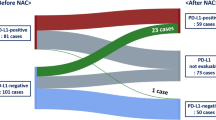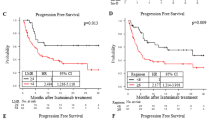Abstract
Purpose
There is increasing interest in immune function in combination with chemotherapy for cancer treatment. However, the effects of chemotherapy on the human immune system remain to be determined. The aim of this study was to investigate the prognostic impact of lymphocyte and neutrophil counts in colon cancer patients who were treated with curative surgery and adjuvant chemotherapy.
Methods
Two hundred thirty-one patients with colon cancers who underwent curative surgery and FOLFOX adjuvant chemotherapy between November 2005 and December 2011 were included. Oncologic outcomes were analyzed with neutrophil count, lymphocyte count, and neutrophil-to-lymphocyte ratio (NLR) before and after chemotherapy.
Results
The 5-year DFS rate was lower in colon cancer patients with low lymphocyte count during chemotherapy (61.9 vs. 76.7%, P = 0.026). Cox multivariate analysis demonstrated that low lymphocyte count during chemotherapy was independently associated with poor disease-free survival (HR 1.829; 95% CI 1.096–3.050; P = 0.021) in colon cancer patients who underwent FOLFOX adjuvant chemotherapy.
Conclusion
Lymphocyte count during chemotherapy is a strong predictor of worse disease-free survival in colon cancer patients who have undergone FOLFOX adjuvant chemotherapy.

Similar content being viewed by others
References
Hermanek P Jr, Wiebelt H, Riedl S, Staimmer D et al (1994) Long-term results of surgical therapy of colon cancer. Results of the Colorectal Cancer Study Group. Chirurg 65:287–297
Andre T, Boni C, Mounedji-Boudiaf L et al (2004) Oxaliplatin, fluorouracil, and leucovorin as adjuvant treatment for colon cancer. N Engl J Med 350:2343–2351
Nishijima TF, Muss HB, Shachar SS et al (2015) Prognostic value of lymphocyte-to-monocyte ratio in patients with solid tumors: a systematic review and meta-analysis. Cancer Treat Rev 41:971–978
Ray-Coquard I, Cropet C, Van Glabbeke M et al (2009) Lymphopenia as a prognostic factor for overall survival in advanced carcinomas, sarcomas, and lymphomas. Cancer Res 69:5383–5391
Shin JS, Suh KW, Oh SY (2015) Preoperative neutrophil to lymphocyte ratio predicts survival in patients with T1-2N0 colorectal cancer. J Surg Oncol 112:654–657
Kitayama J, Yasuda K, Kawai K et al (2011) Circulating lymphocyte is an important determinant of the effectiveness of preoperative radiotherapy in advanced rectal cancer. BMC Cancer 11:1471–2407
Kitayama J, Yasuda K, Kawai K et al (2010) Circulating lymphocyte number has a positive association with tumor response in neoadjuvant chemoradiotherapy for advanced rectal cancer. Radiat Oncol 5:5–47
Ceze N, Thibault G, Goujon G et al (2011) Pre-treatment lymphopenia as a prognostic biomarker in colorectal cancer patients receiving chemotherapy. Cancer Chemother Pharmacol 68:1305–1313
Chu-Yuan H, Jing P, Yi-Sheng W et al (2013) The impact of chemotherapy-associated neutrophil/lymphocyte counts on prognosis of adjuvant chemotherapy in colorectal cancer. BMC Cancer 13:1471–2407
Kobayashi N, Usui S, Kikuchi S et al (2012) Preoperative lymphocyte count is an independent prognostic factor in node-negative non-small cell lung cancer. Lung Cancer 75:223–227
Feng JF, Liu JS, Huang Y (2014) Lymphopenia predicts poor prognosis in patients with esophageal squamous cell carcinoma. Medicine 93:e257
Clark EJ, Connor S, Taylor MA et al (2007) Preoperative lymphocyte count as a prognostic factor in resected pancreatic ductal adenocarcinoma. HPB 9:456–460
Vicente Conesa MA, Garcia-Martinez E, Gonzalez Billalabeitia E et al (2012) Predictive value of peripheral blood lymphocyte count in breast cancer patients treated with primary chemotherapy. Breast 21:468–474
Sica A, Saccani A, Bottazzi B et al (2000) Autocrine production of IL-10 mediates defective IL-12 production and NF-kappa B activation in tumor-associated macrophages. J Immunol 164:762–767
Formenti SC, Demaria S (2008) Effects of chemoradiation on tumor-host interactions: the immunologic side. J Clin Oncol 26:1562–1563 (author reply 1563)
Menard C, Martin F, Apetoh L et al (2008) Cancer chemotherapy: not only a direct cytotoxic effect, but also an adjuvant for antitumor immunity. Cancer Immunol Immunother 57:1579–1587
Swann JB, Smyth MJ (2007) Immune surveillance of tumors. J Clin Invest 117:1137–1146
Sakaguchi S, Yamaguchi T, Nomura T et al (2008) Regulatory T cells and immune tolerance. Cell 133:775–787
Sunaga T, Suzuki S, Kogo M et al (2014) The association between neutropenia and prognosis in stage III colorectal cancer patients receiving adjuvant chemotherapy. Eur J Cancer Care 23:394–400
McCoy MJ, Lake RA, van der Most RG et al (2012) Post-chemotherapy T-cell recovery is a marker of improved survival in patients with advanced thoracic malignancies. Br J Cancer 107:1107–1115
Tartour E, Blay JY, Dorval T et al (1996) Predictors of clinical response to interleukin-2-based immunotherapy in melanoma patients. J Clin Oncol 14:1697–1703
Mackall CL, Hakim FT, Gress RE (1997) Restoration of T-cell homeostasis after T-cell depletion. Semin Immunol 9:339–346
Schluns KS, Kieper WC, Jameson SC et al (2000) Interleukin-7 mediates the homeostasis of naive and memory CD8 T cells in vivo. Nat Immunol 1:426–432
Tan JT, Ernst B, Kieper WC et al (2002) Interleukin (IL)-15 and IL-7 jointly regulate homeostatic proliferation of memory phenotype CD8+ cells but are not required for memory phenotype CD4+ cells. J Exp Med 195:1523–1532
Coleman S, Clayton A, Mason MD et al (2005) Recovery of CD8+ T-cell function during systemic chemotherapy in advanced ovarian cancer. Cancer Res 65:7000–7006
Bellone G, Novarino A, Vizio B et al (2009) Impact of surgery and chemotherapy on cellular immunity in pancreatic carcinoma patients in view of an integration of standard cancer treatment with immunotherapy. Int J Oncol 34:1701–1715
Lissoni P, Brivio F, Fumagalli L et al (2005) Enhancement of the efficacy of chemotherapy with oxaliplatin plus 5-fluorouracil by pretreatment with il-2 subcutaneous immunotherapy in metastatic colorectal cancer patients with lymphocytopenia prior to therapy. In Vivo 19:1077–1080
Authors’ contribution
SYO and OKN have contributed to design of this paper, analysis of data, revising this paper and final approval. YBK and KWS have contributed to revising this paper and final approval.
Author information
Authors and Affiliations
Corresponding author
Ethics declarations
Conflict of interest
The authors do not have any conflicts of interest to declare.
Rights and permissions
About this article
Cite this article
Noh, O.K., Oh, S.Y., Kim, Y.B. et al. Prognostic Significance of Lymphocyte Counts in Colon Cancer Patients Treated with FOLFOX Chemotherapy. World J Surg 41, 2898–2905 (2017). https://doi.org/10.1007/s00268-017-4104-6
Published:
Issue Date:
DOI: https://doi.org/10.1007/s00268-017-4104-6




